
- •Lesson (1) Chromosomes and genetic information
- •Remember
- •Remember
- •Importance of crossing over:-
- •Lesson (2) The interaction of genes
- •Remember
- •Remember
- •Inheritance of blood groups in human
- •For illustration only
- •Inheritance of colour trait in mice
- •Inheritance of chlorophyll absence trait in corn plant
- •Lesson (3) Genetic inheritance and diseases
- •Importance of pedigree
- •Answer four questions only
Lesson (3) Genetic inheritance and diseases
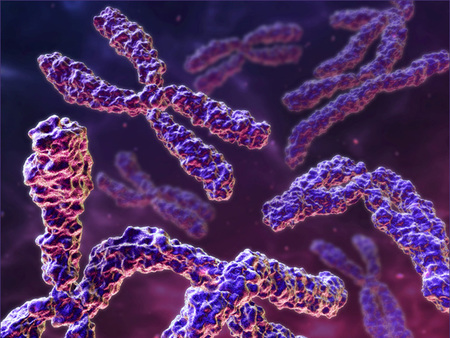
In the past, it was thought that woman controls the sex of her fetus, but in the middle of 20th century, when scientists discovered sex chromosomes, they discovered that man controls the sex of the fetus (not woman)
![]()
Human body has 23 pairs of chromosomes, they are divided into:-
1- Somatic chromosomes: They are 22 chromosomes pairs which are similar in both sexes (male and female)
2- Sex chromosomes: 1 chromosome pair, which determines the sex of human.
- Female cell: it has 22 pairs of somatic chromosomes, and a homologous pair of sex chromosomes (XX + 44)
- Male cell: It has 22 pairs of somatic chromosomes and a non-homologous pair of sex chromosomes (XY + 44)
Chromosomes (X) and (Y) are different in shape and size
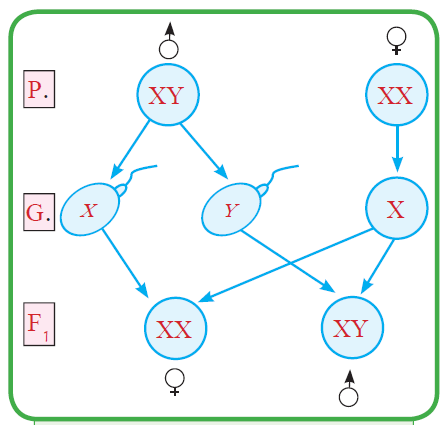
Fig. (5) Probabilities of sex determination of fetus
Gametes are formed from the meiotic cell division of gonads (testes in male and ovaries in female). So, gametes have half the number of chromosomes of somatic cells (Haploid number n)
Male produces two kinds of sperms with equal ratios – a kind of sperms carrying chromosomes (Y) and another one carrying chromosomes (X).
Female produces one kind of ova which carry chromosome (Y)
If an ovum (X+22) was fertilized by sperm (X+22), a female fetus is formed (XX + 44)
If an ovum (X+22) was fertilized by sperm (X+22), a male fetus is formed (XY+44)
Therefore, sperms determine the sex of fetus, not ovum
Genes carried on chromosomes (X) and (Y) are responsible for sex determination.
6 weeks after conception (pregnancy), the fetus carrying (Y) chromosome begins secreting hormones which stimulate the undifferentiated tissues of gonads to form the tests and male sex organs.
12 weeks after conception (pregnancy), the fetus which doesn't carry (Y) chromosome begins forming the two ovaries, and then female sex organs differentiate.
![]()
Klinefelter's syndrome
This syndrome (case) was discovered by Dr. Henry Klinefelter in 1942.
Causes of Klinefelter's syndrome
When an abnormal ovum (XX + 22) – Instead of (X+22) – is fertilized by a sperm (Y+22), forming a fetus (XXY + 44) instead of (XY+44).The extra (X) chromosome causes disorder in sex hormones.
This syndrome appears in males only
Symptoms
1- Infertile male due to the absence of the cells which produce sperms.
2- Mental retardation
3- The appearance of feminine characteristics (Ex. Enlargement of breasts)
4- Tall stature
5- Growth of limbs more than average rate
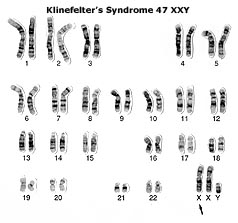
Fig. (6) Karyotype of Klinefelter's syndrome
Turner's syndrome
Causes of Turner's syndrome
When an abnormal ovum (O+22) – Ovum without X chromosome – is fertilized by a sperm (X+22), forming a fetus (XO+44) fetus with only one X chromosome (instead of two)
This syndrome appears in females only
Symptoms
1- Short stature
2- Woman doesn't hit puberty due to the lack of hormones.
3- Slow mental development
4- congenital disorder of heart and kidneys
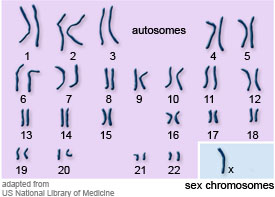
Fig. (7) Karyotype of Turner's syndrome
Down syndrome (Mongolism)
Mongolism was discovered by British doctor Down in 1866
Causes of down syndrome
caused by the fertilization of a gamete (sperm of ovum) gamete carrying a complete number of chromosomes in pair 21, which forms a fetus carrying 3 chromosomes in pair (21) instead of 2 chromosomes.
Baby with down syndrome may be a male (XY+45) or female (XX+45)
Symptoms of down syndrome
1- Delayed growth
2- Short stature
3- Oval face
4- Flat head back
5- Short fingers and toes
6- Narrow eyes
7- Small ears
8- Mental retardation
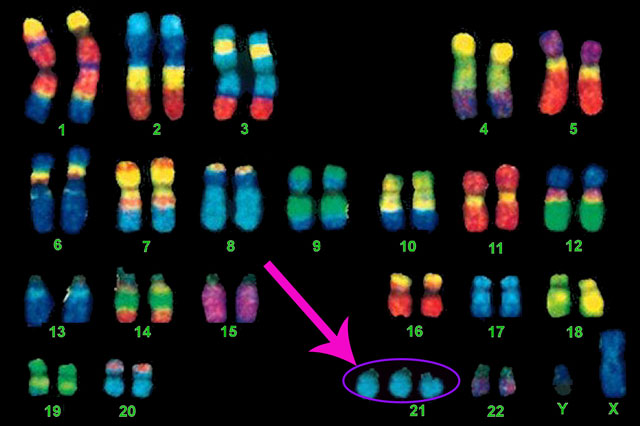

Fig. (7)Karyotype of down syndrome (8) A girl with down syndrome
![]()
Sex-linked traits: They are traits whose genes are carried on sex chromosomes , but their appearance is not affected by sex hormones
![]() Scientist Thomas Morgan was
the first to discover sex-linked traits while studying eye colour
trait in Drosophila insect. He crossed white-eyed male
Scientist Thomas Morgan was
the first to discover sex-linked traits while studying eye colour
trait in Drosophila insect. He crossed white-eyed male
![]()
Drosophila insects with red-eyed female Drosophila insects.
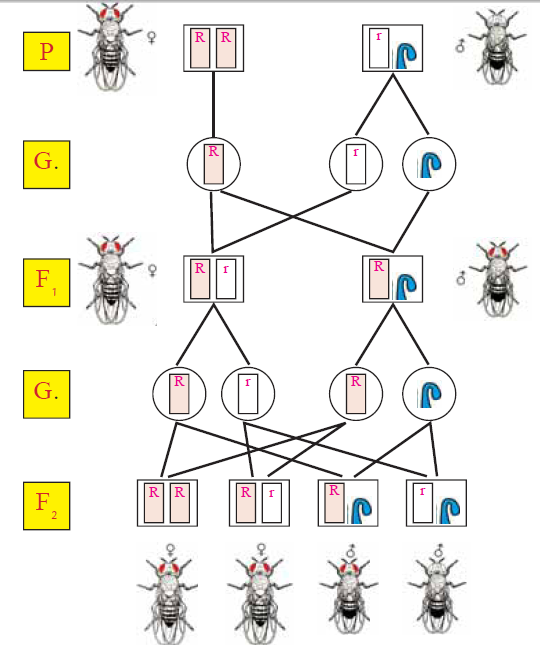
100% of the individuals of 1st
generation are red-eyed, which means
that red eyes traits is dominant
Red-eyed and white-eyed insects
were formed in 2nd generation at ratio
3:1
This trait is not a Mendilian one
Because Morgan discovered that all white-
eyes insects are males!!!!!
Morgan stated that these genes are
carried on sex chromosome (X), while
there are few genes on chromosome (Y)
Eye colour of Drosophila insect is an
Example on sex-linked traits
Sex-linked traits in human
Chromosome (X) in human carries many somatic traits (Ex. Hemophilia – colour blindness – short sight – Muscle atrophy). These traits are inherited from the father to his daughters only because he gives them chromosome (X)
Colour blindness
Colour blindness is caused by a recessive gene on sex chromosome (X).
This gene causes the inability to differentiate between colours, especially green and red
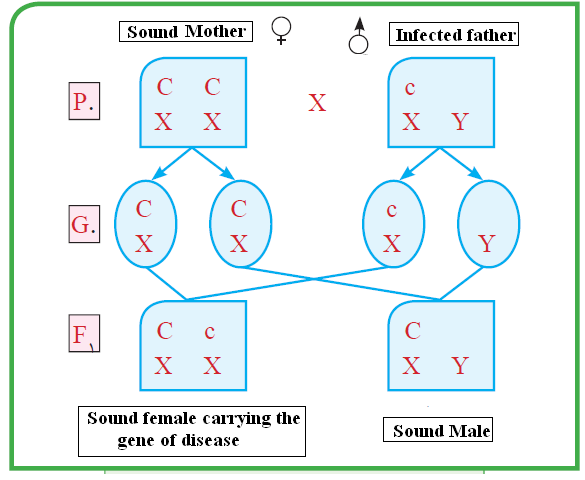
Fig. (9) Inheritance of colour blindness in human
In males, colour blindness trait is represented by only one gene because chromosome (Y) doesn't carry this trait, while it is represented by a pair of genes in females because they have a pair of sex chromosome (XX)
A male doesn't give this trait to his sons, because they inherit from him chromosome (Y) not chromosome (X) (which carries colour blindness trait)
Sons and daughters can inherit this trait from mother because they inherit chromosome (X) from her (which carries colour blindness trait)
Male can give this trait to his grandsons through his daughters.
Hemophilia
Hemophilia: Genetic disease which causes the inability of body to control blood clotting (coagulation) process – the process which stops bleeding
Hemophilia is caused by a recessive gene carried on chromosome (X), this gene disables the body to control blood clotting process because some substances which are essential for blood clotting process are not formed
Hemophilia may cause death, especially in childhood stage
![]()
Sex-influenced traits: They are traits whose genes are carried on somatic chromosomes, and their appearance is affected by sex hormones
Sex-influenced traits are affected by male and female sex hormones
Examples:-
1- Horns trait in cattle
2- Baldness trait in human
3- Shortness of index finger trait in human
Baldness
The following figure describes the inheritance of hair loss trait in human
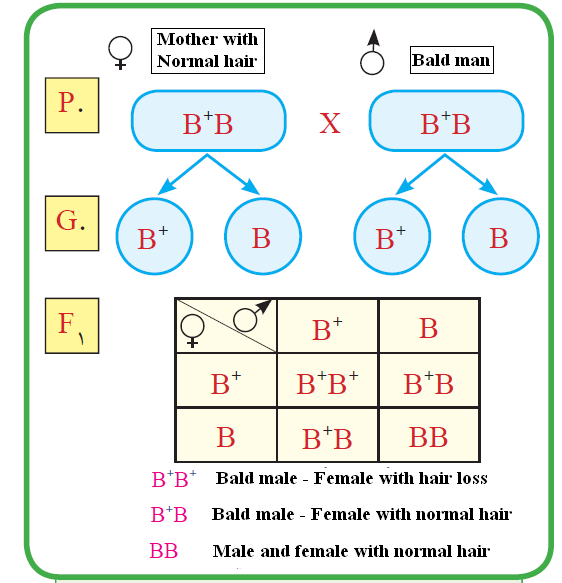
Baldness trait appears due to the existence of a dominant gene responsible for hair loss, this gene is affected by male sex hormone only.
The appearance of baldness trait is different in males and females.
baldness appears in males in cases of pure gene (B+B+) and hybrid gene (B+B) due to the influence of male sex hormone on them
Hair loss trait in females appears only in case of pure gene (B+B+)
People with genetic structure (BB) have normal hair

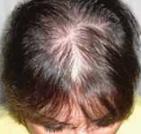
Fig. (10) Hereditary baldness in men Fig.(11) hair loss in women
![]()
Sex-limited traits: They are traits which appears in one of the two sexes only due to the difference in sex hormones
Sex-limited genes are responsible for the appearance of certain traits in each sex.
Examples:-
Milk production trait is limited on females only because they have sex hormones which stimulate the gene of this trait
Secondary sex characteristics in humans (Ex. The appearance of beards in men)
The ability of birds to lay eggs.
![]()
A- Pedigree (family tree)
Scientists find it hard to study the inherited traits and their transfer to human due to:-
- The long time period between one generation and another.
- The small number of individuals resulted from every marriage
So, scientists study some hereditary traits in human by studying the pedigree (family tree) of some families
Pedigree: Hereditary data represented in the form of chart diagram which explains how a certain trait is inherited, and used in tracking different hereditary traits
